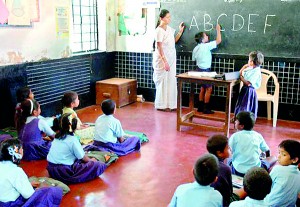The real teachers
View(s):The story of coaching institutes that have quietly integrated themselves with mainstream education and help students cope with the constant changes in exam patterns
While most Class 10 students are experiencing nervous moments for being at the threshold of stepping into college life, Arjun Shetty is already securing his path for two years later. An aspiring engineering student, pre-university (PU) is much more than prep-time for him; so much so that despite months to go for the tenth board exams, he has already decided which college to join for Class 11.
The criteria? Which college will prepare him most to crack the always-tough exam to gain entry into one of the prestigious Indian

Students at a FIIT coaching centre
Institutes of Technology (IIT).
Arjun has successfully qualified to join a college in Bangalore for the PCMB (physics, chemistry, biology and mathematics) course. The entrance test was conducted by a leading coaching institute way before the tenth standard exams. The specialty of this course is that the college will be tutoring its students only in a few subjects. The core subjects will be taught by a private coaching class chain. Arjun’s parents will spend a whopping Rs. 70,000 per year for the core subject training alone. The fees for the remaining subjects which will be handled by the college faculty is not yet known.
This demonstrates how the erstwhile ‘tuitions’, now widely known as coaching/training institutes, have quietly integrated themselves with mainstream education. Once only an additional and optional prospect, these extra classes are now a given in most students’ life.
It is not easy to put a date on when the ‘tuition phenomenon’ started. But those involved in the sector for long will tell you that before the 1990s, the coaching institute industry was a highly fragmented one.
The beginning
Sai Kumar Swamy, director of the Triumphant Institute of Management Education (T.I.M.E.), Bangalore, recalls how during 1995-96, the consolidation of the sector began with the advent of the telecom and Internet industries, due to which these private institutes could reach a wider audience. “Even now it is quite fragmented. But there are single-chain, national players emerging who are offering stylised products. And parents don’t see it as an expenditure, they see coaching centres as an investment,” he explained.
The rise and rise of these coaching institutes has much to do with the changing trends in courses as well. As Mr. Swamy explained with the example of the management education business, “At that time, a small group was writing the Common Admission Test (CAT). Now, the demand and supply have gone up significantly.” He recalled that there was only one well-known management training institute in the 1970s.
Sample this: In 2012, there was a record sale of 2.15 application vouchers for CAT. The number of applicants who registered for CAT 2011 and 2010 was 2.05 lakh and 2.04 lakh, respectively. (Source: T.I.M.E.)
So is the case with the State’s Common Entrance Test (CET). Vallish Herur, director of BASE, spoke about the increase in both awareness for preparations and the number of takers for these tests. “In 1991, there were three who came to us for IIT training, today we have 1,000.”
Track record
Coaching institutes, big or small, are generally judged by their track record i.e., results. As ‘training’ institutes, their role, stakeholders say, is to more than just supplement the school/college curriculum.
Says Mr. Swamy, “For management seat aspirants, who are usually in the age group of 19 to 21, we help them remember what they have already learnt and also train them in how to apply it in a timed environment.”
Mr. Herur begs to differentiate between “tuitions” and his institute. “In tuitions, students are taught what is taught in school and for the same exam. We train for competitive exams; it is complementary to what schools and colleges teach.”
But aren’t extra classes taxing for the students? “They are just opportunities to test themselves to give speed and accuracy, for which practice is required,” Mr. Herur said.
Lasting trend?
So, is the coaching institute phenomenon a passing trend or a lasting one?
Mr. Swamy is optimistic. “Education is seen as a sunrise sector. Well-qualified people with the intent and aptitude to teach, many of them IIT graduates, are joining coaching institutes as teachers,” he said.
Important role
He added that coaching institutes will be in the reckoning as they play a very important role in helping the students cope with the constant changes in exam patterns.
Mr. Herur added: “Schools prepare the students for the board exams, but they don’t address preparations for competitive exams.”
The dark side
However, not everything is hunky-dory in the tuition sector. Earlier this year, when paper leaks rocked the II PU Karnataka final exams, the State’s Department of Pre-University Education openly accused the “tuition mafia” of having a hand in it.
The allegations arose after the Department traced the paper leaks to government college lecturers, who were teaching in private colleges and also taking tuitions.
They sold the question papers due to the stiff competition among the centres offering tuition. This raises, yet again, the question of regulations (or the lack of them) for private coaching institutes regarding fees, faculty and teaching itself.
It may be recalled here that a certain Pre-Examination Coaching Centres Regulatory Authority Bill, to curb the mushrooming of private coaching institutes, never went through.
-thehindu.com
Follow @timesonlinelk
comments powered by Disqus




















